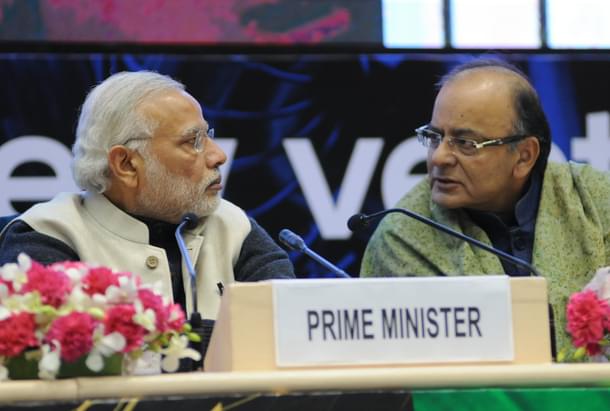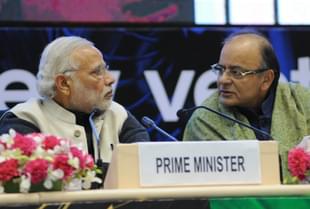Economy
Post-DeMo & GST, Minimum Basic Income Can Be Modi’s Next Big Disruption. It’s Worth A Look
Swarajya Staff
Jan 04, 2017, 04:09 PM | Updated 04:09 PM IST
Save & read from anywhere!
Bookmark stories for easy access on any device or the Swarajya app.


The Narendra Modi government is coming up with a report which is likely to endorse giving all Indian citizens a guaranteed Universal Basic Income (UBI). Thomas Colson wrote in Business Insider (BI) today (4 January) that the said report will be released this month. BI talked to Prof Guy Standing, one of the leading advocates of UBI, and he says the report by the government will term the idea as feasible and “basically the way forward.”
A pilot project in eight villages of Madhya Pradesh that Standing was closely associated with provided every person with a guaranteed basic income for 18 months. “The most striking thing which we hadn't actually anticipated is that the emancipatory effect was greater than the monetary effect. It enabled people to have a sense of control. They pooled some of the money to pay down their debts, (and) they increased decisions on escaping from debt bondage. The women developed their own capacity to make their own decisions about their own lives,” BI quoted Standing saying.
Is the Indian government really serious about implementing UBI? We don’t know for sure but it seems to be weighing the pros and cons of the idea. In an interview to Rediff in September last year, the chief economic advisor (CEA) to the government of India, Arvind Subramanian, had said that UBI would be one of the exciting themes of the next Economic Survey. This is due on 31 January. So, we will know the Finance Ministry’s assessment of the proposal by the end of the month.
Subramanian has said that “this is an idea that has a lot of promise, but also challenges. It will be an extension of JAM (Jan Dhan, Aadhar, Mobile Money) in that it will be based on cash transfers.” What the CEA is saying is that universal basic income is essentially a form of cash transfer. It doesn’t matter what you name it, but it is an alternative to providing subsidies in kind, are subject to leakages and corruption. In the Indian version of UBI, basic income may be a migration of subsidies to cash in the first instance. Between major subsidies and payments for the MGNREGA employment guarantee scheme, the government spends nearly Rs 3,00,000 crore per annum - roughly two percent of GDP.
Many people oppose UBI because they are against the idea of government giving doles. But the choice is not between giving subsidies and not giving. It is about picking between efficient cash transfers and an inefficient subsidy regime. As this Swarajya column argues, UBI should be seen as redistribution of currently paid subsidies to enable people to eliminate market distortions and giving citizens a choice on what they will spend their subsidy money on.
With the JAM trio – Jan Dhan, Aadhaar and Mobile money – we have the system in place for providing everyone with a universal basic cash transfer.
How do we finance UBI?
If we accept a ceiling of two percent of GDP on central subsidies, in 2016-17 some Rs 3,00,000 crore will be available for cash transfers. Assuming around 25 crore households (there is a similar number of Jan Dhan accounts) in the country, this money is enough to deliver an annual income of Rs 12,000 per household, or Rs 1,000 per month.
The government’s Economic Survey for 2014-15 estimates that subsidies for the following items amount to 4.2 percent of GDP (Gross Domestic Product): cereals, pulses, sugar, oil-related products, iron ore, fertilisers, electricity, water, and rail services. Now, if we increase the ceiling to say four percent of GDP, every household will get Rs 2,000 per month. If we halve the number of households to be targeted, the figure rises to Rs 4,000 per month. This is a very substantial amount for people living in abject poverty and can greatly impact their lives in a way that a leaky subsidy system can never do.
Apart from this there are government subsidy schemes too. A desirable thing for them to do would be to divert most of the spending from inefficient subsidies to areas like education and healthcare. While the latter is a state subject, the former is in the concurrent list and hence the joint responsibility of centre and states. In this way, both can complement each other in social spending.
A UBI - or an Indian variant of it - the universal subsidy cash transfer - is an idea whose time has come. All the necessary ingredients (JAM) to implement it are in place. However, a lot of groundwork is required before implementation. And once implemented,, it may take years before it can be made near perfect. But a start needs to be made.
Also, if Modi wants to emerge as the greatest messiah of poor among politicians of independent India, he won’t get a better deal than this.
UBI is politically rewarding, fiscally responsible and economically sensible. Modi government should start cracking on the idea sooner rather than later.
Further reading:
Why India Could Shift From Guaranteed Boondoggle (NREGA) To Minimum Income For Poor.
Universal Basic Income Is Worth Fighting For Against All Odds.





